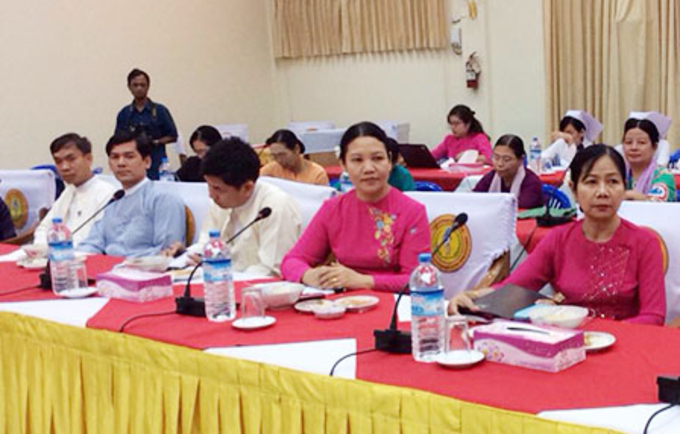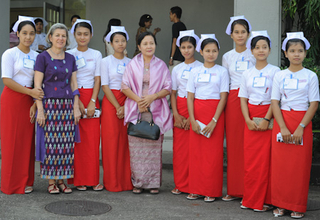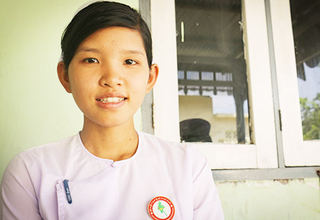UNFPA in cooperation with the Department of Health Professional Resource Development and Management (DHPRDM), Department of Public Health (DoPH) and the Myanmar Nurse and Midwife Council (MNMC) are working closely developing recommendations of higher levels of midwifery skills in order to attain better quality of sexual reproductive health, maternal, newborn health services, including a professional development career pathway for midwives which are in accordance with the ASEAN Regional Guidelines for Minimum Requirement for Training and Accreditation of Skilled Birth Attendants as well as provided the necessary training needed in order to ensure that every child birth is safe.
Dr. Hla Hla Aye, Assistant Representative of UNFPA said in her opening remarks that “Midwives are the backbone of Myanmar’s primary maternal health care system and crucial to improving the quality of services of pregnant women, new mothers’ and newborns. Properly trained midwives have reduced instances of maternal deaths and child deaths in Myanmar which remains high with 200 maternal deaths per 100,000 live births.”
Dr. Hla Hla Aye emphasized that in order to accelerate and sustain the reduction in maternal and neonatal mortality and morbidity, the ASEAN Work Plan for Maternal and Child Health for 2011-2015 seeks to enhance, among others, the competency of health workers or practitioners in becoming accredited skilled birth attendants, addressing the capacity needs of the health work force in maternal, newborn and child health care at the local community levels.
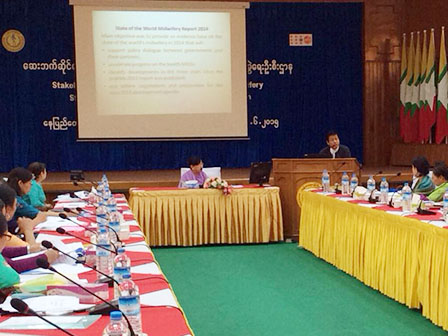
In Myanmar there are currently only 1.3 health workers for every 1,000 persons. This is less than the 2.3 standard advised by the World Health Organization (WHO). In order for Myanmar to achieve Millennium Development Goal 5 of reducing the maternal morality ratio to 105 maternal deaths per 100,000 live births, it is estimated that an additional 7000 midwives or skilled birth attendants are needed. UNFPA supports in cooperation with its implementing partners capacity building for Myanmar’s 50 midwifery and nursing training schools.
The objective of the two day workshop was to outline core competencies of Myanmar’s midwives services which are in line with the ASEAN Regional Guideline for Minimum Requirements for Training and Accreditation of Skilled Birth Attendants. The participants also developed a draft proposal on career advancement for the country’s midwifes, including an action plan to upgrade the midwifery education from the current diploma to bachelor and master’s degrees. All of the draft recommendations derived from the meeting will be submitted to the Ministry of Health for evaluation and approval with the aim of having the national midwifery standards guidelines published.
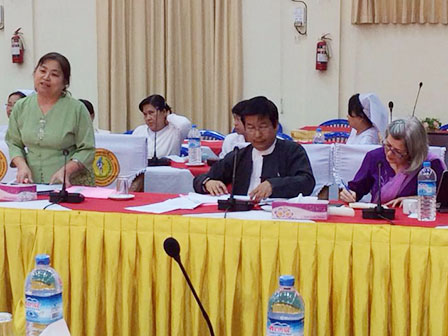
Prof. Dr. Nwe Nwe Oo, the Director General of the Department of Health Professional Resource Development and Management (DHPRDM) said at the workshop that the performance and skills of health workers, including midwives in Myanmar were indicators of the health care standards of the country and that the “need for more efforts to reduce maternal health and newborn deaths were needed.”
Participants included representatives the Department of Health Professional Resource Development and Management (DHPRDM), Department of Public Health (DoPH) which fall under the Ministry of Health (MoH), including Assistant Directors of nursing from Myanmar’s states and regions, principals and trainers of midwifery schools, professors and heads of nursing universities, Jhpiego, and members of the Myanmar Nurse and Midwife Association (MNMA) and Myanmar Nurse and Midwife Council (MNMC).
